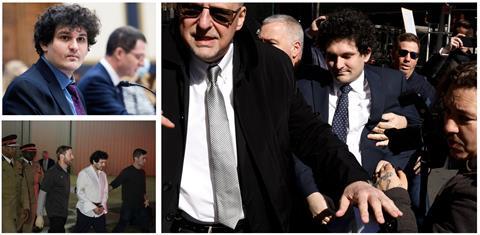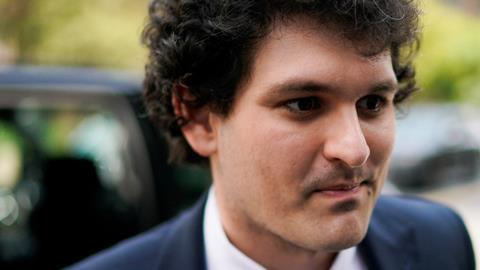Sam Bankman-Fried was on course to become the world’s first trillionaire, before his virtual empire spectacularly collapsed in scandal. He’s due to be sentenced later this month, but Martin Saunders says there’s a surprising lesson the Church can learn from him
I’m going to tell you a story about a rich young man. He had everything; arguably more than anyone his age had ever had before. Still one thing he lacked though, and it kept him awake at night. So he began to pursue a question: “Even though I have everything, what good deed must I do in order to make my life really count for something?”
This is the tale of a privileged American banking prodigy who made an almost unimaginable amount of money in the time it takes most people to complete a university degree. That he lost it all in a matter of weeks feels like his just deserts – a confirmation that no one should get that rich, and certainly not that quickly. And yet, my guess is that by the time you’ve finished reading this, you may not feel entirely sure…in fact you may even feel – as I do – that it’s kind of a shame that the rich young man didn’t quite reach the incredible levels of wealth he seemed to be aspiring to.

Going infinite
The atheist son of atheist academic parents (I’m not doing much to endear him to you), Sam Bankman-Fried enjoyed an almost uninterrupted ascent to wealth, success and power. A nerdy, wild-haired gamer who precisely no one would expect to make the cover of Forbes, SBF (as he’s become known by the fascinated media) was nonetheless blessed with an extreme intellect and unorthodox brain which made him catnip to Wall Street. When he graduated from the acclaimed Massachusetts Institute of Technology (MIT) in 2014, he was snapped up by Jane Street Capital, a New York investment company which promptly made him a millionaire; three years later, he was on his way to a salary of $10-15m a year. He didn’t stick around to collect though; SBF had bigger fish to fry.
What happened next is documented in a new book by Michael Lewis, the author of church favourite The Blind Side (WW Norton & Company). When he began writing Going Infinite: The rise and fall of a new tycoon (Penguin), Lewis thought he was detailing the unstoppable rise of the world’s first trillionaire and, for a while, it looked like he had every reason to believe that. After leaving Jane Street in 2017, SBF set up his own trading company called – because all trading companies have bland names designed to prevent media attention – Alameda Research. Unlike Jane Street, however, which dealt in more traditional trades, Alameda was set up to charge into the new Gold Rush which was taking the confused global financial markets by storm: cryptocurrency.
In order to live the best possible life, we should try to make the biggest impact we can
Less than two years later, SBF took the step that both threw his career into overdrive and sowed the seeds of its eventual demise: he founded a cryptocurrency exchange. FTX was a platform which enabled cryptocurrency trading, taking a tiny slice of each one. And since the geniuses who had programmed it had developed a way to allow a huge number of transactions to safely take place every day, those tiny slices began to add up. More than a million regular people, keen to try their hand at trading on the new crypto frontier, signed up for accounts and deposited money with FTX, which became a kind of bank for its users. The sums of money involved, especially as certain cryptocurrencies began to skyrocket, were eye-watering. At its height, FTX had an estimated $16bn in customer money. As the owner of both FTX and Alameda Research, SBF himself was worth $26.5bn, according to Bloomberg. He was just 30 years old.
A life that counts
Here, however, is where it gets interesting. One might imagine that with that kind of money burning a hole in his pocket, SBF would have developed some expensive tastes. Luxury yachts, impossibly fast cars, diamond-encrusted Rolex watches and the like; all would seem fitting for a young billionaire taking the financial world by storm. Yet the accumulation of possessions and even wealth itself held no interest for SBF. His trademark schlubby outfits – baggy T-shirts, cargo shorts and trainers – often looked like he had slept in them. He bought little, ate cheaply, often lived in modest accommodation and devoted himself almost entirely to his work. The reason: because that work offered him an opportunity to make sense of and give meaning to his life…but not in the way we might assume.
While he was still at college, SBF became a devotee of Effective Altruism, a humanist philosophy developed by a group of philosophers and academics from the University of Oxford. Effective Altruism – which also counts controversial tycoon Elon Musk among its adherents – is focused on maximising the impact of charitable giving. Its core idea is that in order to live the best possible life, a person should try to make the biggest impact they can in terms of lives saved. One might choose to do that by training as a doctor and relocating to a part of the world where medical expertise is most needed. Another option – chosen by SBF and others – is to earn the maximum possible amount of money in order to give it away. Specifically, to charitable endeavours which are making the biggest impacts, perhaps in areas that are under-researched, lower profile or poorly funded.
Bankman-Fried’s way of making meaning out of life was to try to earn more money than anyone else in history, so that he could give it all away to the people who needed it most. It’s what fuelled his relentless rise and drove him to turn millions into billions. And, ultimately, it’s what led to the lapses in judgement that brought his whole empire tumbling down.
If Crypto leaves you cold – a painless guide
One of the most extraordinary things about cryptocurrency is how few of us truly understand it. Most people who own and trade crypto don’t actually know what’s going on under the hood. Even SBF himself entered this world with barely a passing understanding. The language register and the abstractness of the concept seem to create huge barriers to comprehension. Here then, in terms a child would understand (I checked), is the very basic version:
Just as Spotify shares digital music – replacing CDs – and your Kindle gives you digital books that need no paper, cryptocurrency is a digital form of money which replaces coins or notes. The big attraction of crypto is that it is not controlled by a central bank or government, but rather belongs to you, as if you have a special safety deposit box that can only be accessed with a unique code. If you want to share or sell some of your crypto, you can use that code to make the transfer, without needing a middleman such as a bank.
These transfers are then recorded on something called The Blockchain (stay with me!). This is simply a publicly visible ledger which tracks where the crypto has gone and who has it. Imagine a long, long chain of Lego bricks. Each time a new transaction takes place, a new brick containing that record is added to the chain. It is very, very hard to change the chain and, if you do, everyone will see it.
Bitcoin is the most famous cryptocurrency. Its extraordinary rise in value has made a lot of early adopters eye-wateringly rich. But it’s just one type of crypto among many – just as Sterling is only one of the world’s myriad currencies.
Investment in rising crypto – like getting in on Bitcoin at the right moment – could be viewed as a fantastic piece of stewardship, a rare modern opportunity for the ‘good soil’ principle of Matthew 13:8 to be enacted. Imagine how much ministry could be funded with 100 Bitcoin! At the same time, the volatility of crypto means that investing in it could be viewed as little more than gambling, with the same risks of addiction attached. It might also be argued that there are some major ethical and environmental implications to consider. Some cryptocurrencies require significant energy consumption for mining, while legal and regulatory compliance is patchy.
As an increasingly important element of our tech-dominated world, crypto is something that we need to be aware of and think through. So while Christians will land differently on this, as on so many other issues, ignorance can be no defence.
An instant unravelling
When the end arrived, it came at staggering speed – like a train heading full-pelt off the end of an unfinished track. In November 2022, evidence of financial fraud within FTX and Alameda Research began to emerge, and investors quickly tried to withdraw their money. There was a fairly spectacular problem, however: the money wasn’t there. Both companies – and a range of subsidiaries – were declared bankrupt. Billions of dollars had apparently just vanished.
The details of the case that followed are rich and complex, but the key details are simple enough. Part of the problem came from the massive devaluation of currencies and shares held by these companies. But the bigger issue – the extremely illegal one – was that SBF had used the two interchangeably. He’d taken billions of dollars of customer money out of his trading platform, FTX, and moved it into his investment company, Alameda. He had used customer money as if it was his own, and while many of the resulting losses were felt by funds and wealthy bankers, many were suffered by ordinary people. SBF was charged with seven counts of fraud and money laundering, and found guilty on all of them in November last year. A sentencing hearing is scheduled for the end of this month, and many experts predict that he could spend decades in prison.

The lesson of the rich young man
So how should we feel about Bankman-Fried? In one sense, the answer seems simple: here is a modern-day Icarus; rightly burned because he reached too far. Yet motive matters, and while the purity of his intentions is disputed, SBF maintains that he did it all in a misguided quest to bring healing to a broken world. Michael Lewis, a Wall Street veteran who has learned to spot greed a mile off, seems to believe him. I find the whole affair challenging, too.
What is impressive about the Effective Altruism that drives people like SBF is the totality of it. This isn’t about a tithe; at its worst a measly conscience-assuaging fraction of wealth which enables the giver to feel better about the larger portion kept behind. This is about earning extraordinary sums of money so that it can all be put to great use: in the saving of people who might otherwise die. If I earn $1m, I can pay for ten doctors in a country ravaged by disease; if I earn $100m, then you can multiply that impact out. It turns life into an equation which demands our maximum input, in order to enable the greatest possible output.
The challenge of Effective Altruism still rings true: you strain every sinew to ensure that every possible person can hear the gospel
Now, we might argue that while saving physical lives is of some value, the most valuable thing we can do is lead people to faith in Christ, so that they might experience life in all its fullness now and in the age to come. Yet wherever your interpretation of the gospel stands on the scale between social justice and eternal salvation, the challenge of Effective Altruism still rings true. If you believe that meaning is found in saving the maximum number of lives, then you strain every sinew to ensure that every possible person can hear the gospel; you employ every waking moment of your life towards that end. Like Oskar Schindler, you should come to the end of your life lamenting the ‘one more’ you could have rescued, not feeling pleased that you spoke to four people about Jesus in your local Costa.
Here’s the real question: how big is our vision for the scale of what can be accomplished by the Church? How many do we dare to dream could be fed, clothed and led into eternal life? Our answer should define the effort and intensity that we apply to those tasks and, perhaps, the amount of money and resources we’re prepared to devote to them. Ultimately, SBF failed because, in his relentless pursuit of such goals, he allowed his morals to come loose. Yet I think we miss something if we simply write him off. He believed that if you really want to save the world, you have to give absolutely everything to the task. What if the Church really did that?






































No comments yet